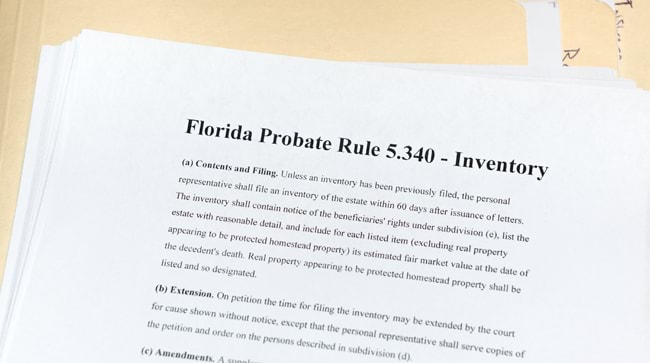When an individual passes away in Florida, estate attorneys will require documentation and information regarding the decedent, their assets and the official details surrounding their death which includes their death certificate. In order for this to happen, the executor of the estate is required to accumulate as much information as possible following the passing of the decedent. Because this is often a complex process, it is highly encouraged to work with an experienced estate attorney to help plan and execute the probate inventory process. This can ensure the best possible outcome for all parties involved, with a minimal amount of court fees and time spent during the process.
Below is a list of the documents that are required in Florida to begin the process of probating an estate.

- The decedent’s will with any codicils, trusts and/or amendments
- A minimum of two copies of the decedent’s death certificate that omit the cause of death
- Copies of the following documents:
- Bank statements from the decedent’s bank for the month in which they passed away
- The decedent’s brokerage statements for the month in which they passed, which include any certificates of deposit
- Stock or bond certificates that may have been held outside the decedent’s brokerage account
- Any general or limited partnership agreements, certificates or any other related documents
- All information surrounding mutual fund accounts the decedent may have had
- Deeds to real property, wherever they may be located
- Mortgages, mortgage notes, amortization schedules and any other related information surrounding the mortgage
- IRAs, Keogh plans, pension plans or annuity plans, as well as all related information surrounding these
- Forms 1040 for the decedent’s final two years
- Florida Intangible Tax Returns for the the decedent’s last two years
- Form 709 gift tax returns, if any have been filed
- State income tax returns that may have been filed in the decedent’s last two years
- Certificates of title for any vehicles the decedent owned at the time of their death, including automobiles, motorcycles and other titled motorized vehicles
- Any life insurance policies the decedent may have had
- A listing of any and all personal property owned by the decedent at the time of death, including its estimated value
- A listing of collectables in excess of $3,000 if present, including insurance riders
- Safe deposit box information, including the number(s), location and inventory present within
- Contact information of the decedent’s accountant, including their name, telephone number and address
- A list of all pending lawsuits, if applicable. This includes suits regardless of whether the decedent is named as the plaintiff or defendant.
Filing Details
In addition to compiling an inventory for probate proceedings, there are other things to be aware of during the process of probating an estate. Probate inventory is generally covered under Florida Probate Rules, which explains and lays out the rules, guidelines and details for the probate process. Something to keep in mind when beginning the inventory process is that in Florida, probate inventory is required to be filed no later than sixty days after the issuance of letters of administration.
The guidelines specifically regarding probate inventory are covered under Florida Probate Rule 5.340, which has been conveniently compiled in this Florida Probate Inventory Form PDF. This sets forth the rules that must be followed in order to properly file the inventory, on top of the documentation previously listed. Per this rule, probate inventory is also required to be sent to a surviving spouse (if there is one), as well as each heir, residuary beneficiary and any other person with an interest in the estate if they request it in writing.
Inventory Disputes
One of the allowances of probate rule 5.340 is that beneficiaries are permitted to request a written explanation of how the value of each asset in inventory was determined. Any asset in question that was formally appraised during inventory is required to have a copy of the appraisal furnished to the inquiring beneficiary. While there is no official time frame for written objection to an inventory, there are certain actions that can be taken if the value is reasonably in question.
As an example, if an estate consisting of property and cash were to be divided up between two beneficiaries, with one beneficiary receiving the cash and the other the property, then the accurate valuation of the property would be critical to ensure a fair distribution of the estate. If disputes arise between beneficiaries that are not able to be mediated outside of court, then probate litigation may be required in order to settle the matter.